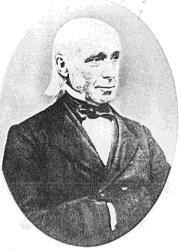“Orphic Sayings” in the Dial (1840–1841, 1842)
For better or for worse, the work for which Bronson Alcott is best known is the “Orphic Sayings.” Alcott published several sets of Orphic sayings, as well as Pythagorean sayings, in various periodicals in the early 1840s, but his most famous set was those in the Dial. It is upon these “much-ridiculed but little-read” sayings that much of Alcott’s reputation as an author has been based.
Alcott preferred writing in a compact, epigrammatic style which relies upon the reader to synthesize and associate. This collection of 100 sayings fuses Platonic, Neoplatonic, and Christian themes, and the alert reader will note that the result is actually a version of the Transcendental gospel not too different from Emerson’s own.
Ralph Waldo Emerson (1865; published 1882)
Ralph Waldo Emerson: An Estimate of his Character and Genius was written by Alcott in 1864 in praise of his friend Emerson. At first called “The Rhapsodist,” it was privately printed and presented to Emerson as a surprise for his sixty-second birthday on May 25, 1865. Alcott had the book publicly reprinted after Emerson’s death in 1882. An online version can be found at the University of Michigan’s Humanities Text Initiative.
Sonnets and Canzonets (1882)
This book, Alcott’s last, contains some of his most memorable and celebrated poetry. The sonnets are dedicated to his family and his most beloved and respected friends. Among those Alcott remembered in Sonnets and Canzonets were William Andrus Alcott, William Russell, Ralph Waldo Emerson, Henry David Thoreau, William Henry Furness, William Ellery Channing, Elizabeth Peabody, Lidian Emerson, Margaret Fuller, W. Henry Channing, William Torrey Harris, Franklin B. Sanborn, Benjamin Marston Watson, W. Ellery Channing, Nathaniel Hawthorne, Ednah Littlehale Cheney, Ellen Chandler, Cyrus Bartol, Samuel J. May, Wendell Phillips, John Brown, Theodore Parker, and William Lloyd Garrison. An online version can be found at the University of Michigan’s Humanities Text Initiative.
